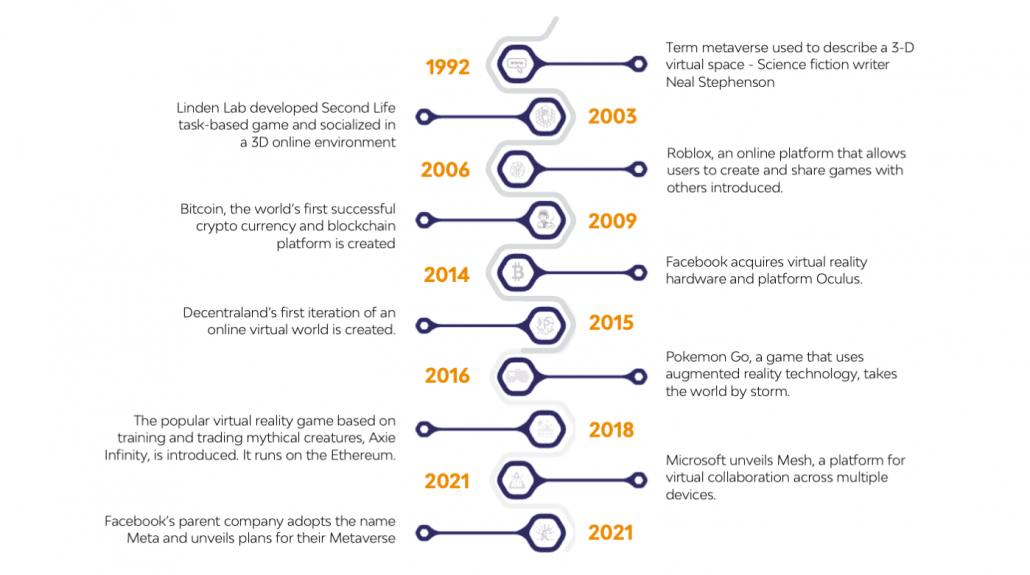Metaverse Services for a Limitless Digital Universe
Metaverse has taken the world by storm in the last two years, yet it feels like talking about the internet in the 1970s or social media in the early 2000s. A developing concept with seemingly endless possibilities to change the way we experience things, Metaverse’s market is expected to surpass $780 Bn by 2024 [Source: Bloomberg]. This has inspired leading brands across industries to invest heavily in this space.
Leveraging non-fungible development, robotics, IoT, AR/VR, and blockchain, Metaverse aims to seamlessly link virtual and physical worlds to open opportunities otherwise impossible to experience. The top sectors that leveraged Metaverse in 2021 are gaming, entertainment, and retail, with the brands creating their exclusive collection of virtual items and immersive experiences for their customers.
How did Metaverse begin?
To truly understand the Metaverse concept, we need to walk back in time. In his science-fiction novel, Snow-crash, Neal Stephenson first coined Metaverse. He used the term to describe a 3D virtual urban environment, where primarily the novel’s central plot unfolds.

Since 2003, when the first virtual world in the form of second life was created, several platforms and experimentation have skyrocketed. When blockchain came along, it solved one of the significant issues of not having a trusted mechanism for digital transactions.
This has resulted in the Metaverse taking shape today and will continue to evolve further. In the words of Mathew Ball, author of Metaverse Primer – “The Metaverse is a massively scaled and interoperable network of real-time rendered 3D virtual worlds which can be experienced synchronously and persistently by an effectively unlimited number of users with a unique sense of presence and with continuity of data, such as identity, history, entitlements, objects, communications, and payments. (Source: The Metaverse Primer, by Matthew Ball)
With renewed interests from big players like Meta and Microsoft, it is evident that Metaverse will take user experience to unprecedented heights. Cost of Head Mounted Displays (HMD) and platform interoperability are two significant concerns as of 2022, but this is likely to be resolved in the coming months.
Why should enterprises care about Metaverse?
The popularity of the Metaverse shows in its market size and growth trends.
- The global Metaverse revenue opportunity could approach $800 Bn in 2024 vs. about $500 Bn in 2020. (Source: Bloomberg, Newzoo, IDC, PWC, Statista, and Two Circles)
- North America accounted for 45.3% of global market revenue in 2020, valued at $47.69 Bn, likely to register a CAGR of 43.7%, matching the global average (Source: Emergen Research).
The advantage of the Metaverse is its interactions, which means that the virtual platforms of the future will be a space for all the companies to co-exist and collaborate, changing the landscape of partnerships, brand collaborations, and joint ventures.
Another exciting opportunity in the Metaverse is that it will essentially be an extension of the internet, encompassing a full-fledged decentralized economy, i.e., businesses will be able to attract consumers and craft experiences tailored to audiences otherwise impossible in a traditional financial economy.
How can Metaverse help reshape enterprises?
Here is a glimpse of how different industries can look at the applicability of Metaverse.
Banking
- Immersive data visualization: VR-based 3D graphs for spend analysis for customers and other reports for operations.
- Virtual bank branches: Metaverse-based bank branches simulated by a virtual assistant.
- Payments in Metaverse: Helping and enabling customers to make secure payments for purchases made in the virtual world.
Health Care
- Personalized assistance: VR-based one-to-one assistance for medical advisory.
- AR-based remote expert advisory for diagnosis.
- Metaverse-based digital therapeutics: Helping cure disease and disorders by recording patterns in lifestyle by wearable health monitors and creating Metaverses that bring peaceful digital simulations.
Entertainment
- Metaverse concerts: Theatre and singing concerts with real-life experience.
- Metaverse theme parks: Visitable theme parks created around imaginary theatrical worlds.
- Immersive gaming: Life-like graphics in gaming instead of avatars.
Manufacturing
- Digital twin is set up to simulate and test various machine parameters and provide remote support.
- Metaverse-based collaborative CAD-based product development and testing.
- VR training and machine simulation modules.
Insurance
- Metaverse NFTs insurance policy and claims backed by cryptocurrency settlements.
- AR-based claims – inspection, investigation, and settlement of vehicle insurance cases. Possibility of developing an automated fraud detection system based on AI/ML and historical data.
- Geospatial services based on new policy enrollment services for vehicles and homes.
Retail
- Virtual try-on rooms: VR-based Trial rooms while shopping.
- Metaverse-based shopping: Lifelike shopping malls and planned customized floors with infinite isle and products.
- VR and Digital Twin-based model demonstration: Demonstrating 3D models for cars, furniture, etc.
Others
- Securing and monetizing IP using NFT and blockchain on Metaverse platforms.
- Meta-university to set up a full-scale university system for global education with the best faculties completed with a library, virtual laboratories, and blockchain-based performance tracking system.
- Governance – Records system in Metaverse with a digital record vault can solve many problems related to establishing ownership, property transfer, and taxation, thus reducing the burden on officials and providing transparency to citizens.
What does LTI offer in Metaverse?
Metaverse is predicted to take a trajectory like what e-commerce and cloud had but at an accelerated pace. LTI offers a multitude of services for early adoption of Metaverse, including Advisory services for readiness and architecture setup, platform services, technical implementations of AR/VR, blockchain, digital twin solutions, experience services to design pod-as-a-service and UI/UX design, co-creation of Metaverse Dojos, Metaverse management, and API management. Listed above are only some of the offerings that LTI as a SI provider brings, but as Metaverse experts say – the possibilities are endless.
More from Sandeep Deb
The Rise of Quantum Technologies Quantum Technologies have been spoken about for ages, but…
Latest Blogs
Introduction What if training powerful AI models didn’t have to be slow, expensive, or data-hungry?…
Pharmaceutical marketing has evolved significantly with digital platforms, but strict regulations…
Leveraging the right cloud technology with appropriate strategies can lead to significant cost…
Introduction The financial industry drives the global economy, but its exposure to risks has…




